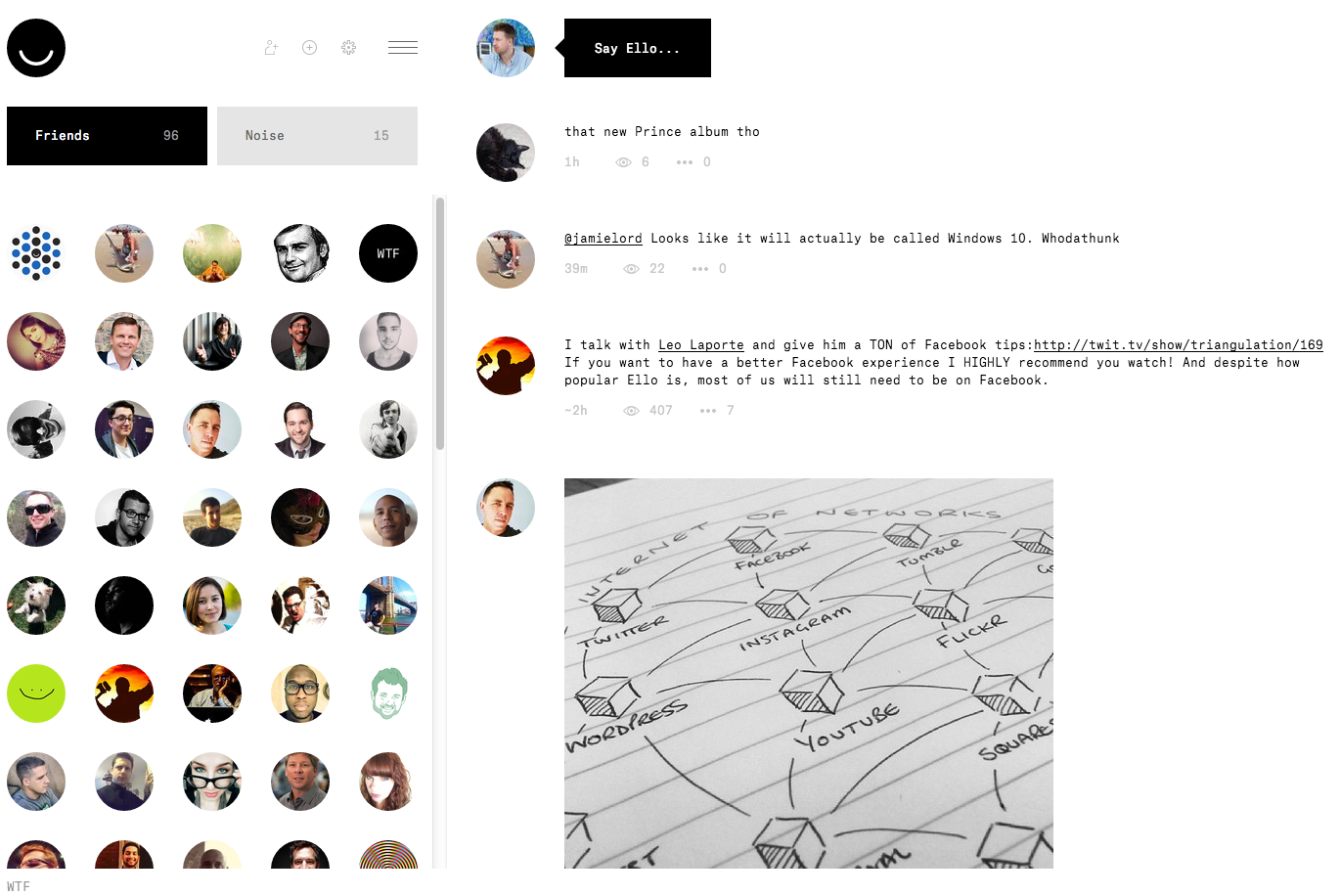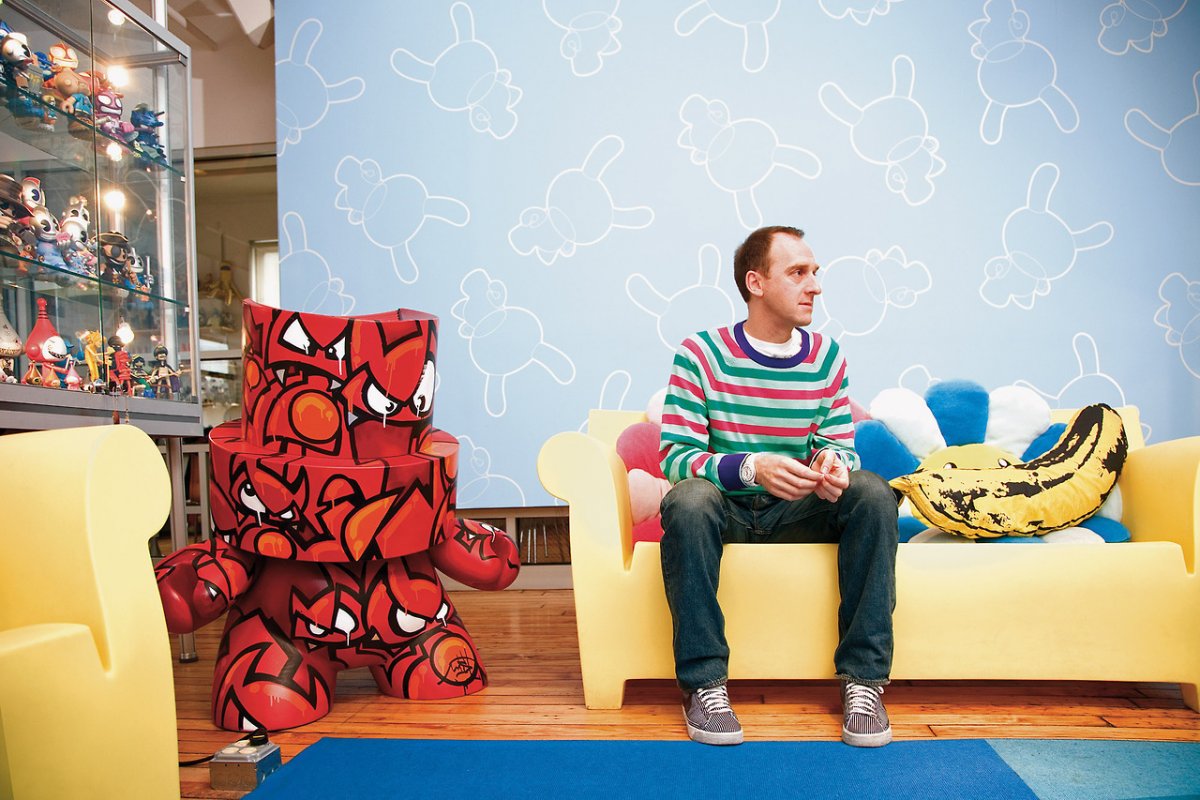
One day this summer, I spent an afternoon with computing pioneer Jaron Lanier talking about virtual reality. Lanier is a leading critic of the internet’s advertising-based business models, and when Facebook’s acquisition of Oculus Rift came up, he pushed the company to look for alternative sources of revenue. "Every time there is a new platform, there is a chance to create a new economic model," Lanier said.
The desire for an alternative to Facebook goes most of the way in explaining the overnight sensation that is Ello, a three-month-old social network founded on the idea that ad-based internet businesses are corrupt. The service, which has yet to build a mobile app and is available only on the web, exploded in popularity this month after reports that artists and LGBT people were fleeing Facebook in favor of Ello, because unlike Facebook it allows them to use pseudonyms. A torrent of press coverage and commentary followed, and the currently invite-only network now has a waiting list of 1 million people.
Founded on the idea that ad-based social networks are corrupt
With this new platform comes the kind of chance Lanier talked about: an opportunity to create a service that succeeds without demanding ever more data about our personal lives. It’s an idea contained in Ello’s founding manifesto, which promises "a better way." "Collecting and selling your personal data, reading your posts to your friends, and mapping your social connections for profit is both creepy and unethical," the company says on its About page. "Under the guise of offering a ‘free’ service, users pay a high price in intrusive advertising and lack of privacy."
At this early stage, Ello offers a clean, modernist design with a bare-bones feature set. Its users post a motley assemblage of photos, one-liners, and disjointed conversations among early adopters. But really, Ello is a dream of starting over — a blank slate where you can create the network that has so far eluded you. Ad-free and pseudonym-friendly, it’s a place where you can easily toggle between your real friends and everyone else — "Noise," as Ello calls them — and where your sharing and messaging are never interrupted by the sight of an unwanted brand.
Exploring Ello
For now, there’s a lot about Ello that’s simply weird. When you log in, your screen is split into two main tabs. The left side of your screen shows you large circular avatars of the people you follow, in a highly inconvenient and basically useless reverse-chronological order from the point that you followed them. (All you can do with the avatars is click them to see the person’s feed of updates; it’s as if half your favorite website was taken up by its blogroll.) The right side of the feed is where you’ll find the posts of the people you follow, and it’s full of posts of every length, from simple greetings to extended essays.

There are photos there, as well, and animated GIFs; Ello has said it welcomes porn, so you may see some of that, too. Replies appear in your feed even when the person you follow is responding to someone you don’t; but you don’t get notified when someone responds to you, because there’s no system for notifications. As with any new network, early adopters are fond of using it to discuss the network itself: users are suggesting interesting accounts to follow; sharing tips (hit shift+1 to make your friends’ faces take up the entire screen!); and complaining about missing features (no block feature; no private messaging).
Ello is half-formed
Ello is half-formed, if that. It’s buggy, the search function doesn’t work, and the site has been plagued by down time in recent days — although perhaps not as much as you would expect, given how quickly it has been growing. There are no mobile apps for Ello as of yet; instead there’s a mobile web client that works well enough.
Founders say that users will eventually pay for the service via small fees for extra features — a few dollars for emoji or the ability to control multiple accounts from a single login. That will start to repay the $435,000 the company raised from FreshTracks Capital, a venture capital firm in Vermont. And over time, the founders say, they hope Ello evolves into a full-fledged alternative to existing networks.
Something will probably kill Ello before any of that happens, of course. But what if it doesn’t? Could this time be different?
Robot, bicycle, social network
Ello was conceived by a team led by Paul Budnitz, a 47-year-old artist and maker of designer toys. He previously founded Kidrobot, a shop for unusual children’s toys, and Budnitz Bicycles, a maker of custom city bikes. Budnitz and some friends wanted to discuss projects they were working on, but were unsatisfied with existing tools. Teaming with the design firm Berger & Föhr and the software developers at Mode Set, Budnitz shepherded the first version of Ello into existence. After teasing the site in April, he began extending invitations to the public in July, and the momentum built from there.
On Thursday, amid reports that drag queens were moving from Facebook to Ello so that they could post under their stage names, Ello was receiving 4,000 signup requests an hour. By Friday, that number was up to 40,000 requests per hour, and that number held steady through Monday, according to a spokesman. It has proven especially popular in privacy-conscious Germany, Ello says, though most of its users are from the United States.
40,000 sign-up requests per hour
The network’s rise was accompanied with growing skepticism that Ello could deliver on its promise of a private, ad-free network that remained mostly free to use. The writer and festival organizer Andy Baio was the first to note that Ello had raised venture capital without disclosing it on their site; he argued the company would find it difficult to sustain its operations unless it quickly raised more. (Ello’s paid features have yet to arrive.) Meanwhile, writer Quinn Norton highlighted the huge number of problems social networks face as they grow. "The code won’t scale. The revenue model won’t be quite right. The hosting will be problematic. People will blame you for bigotry, hate, and even aiding human rights abusers and criminals … and that’s just what happens if people love you."
So what happens if Ello succeeds? It’s going to need money in a hurry. It’s going to need to hire quickly to address all the issues Norton raises, and more. The founders seem aware of this; they declined my interview request, saying they were working around the clock to keep Ello from falling apart.
A history of failure
Much of the skepticism about Ello focuses on a single fact: networks founded on the premise of enhanced privacy have never resonated with a mass audience. People say they value privacy and then volunteer their entire life histories to Facebook. Google+ launched ad-free with a "Circles" model designed to encourage more private sharing; it never took off, and after the departure from Google of its creator, it has been all but in maintenance mode. Path, a four-year-old social network for mobile devices, is moribund in the United States. But the closest analog to Ello may be Diaspora, which raised $200,000 on Kickstarter in an effort to create a private, ad-free Facebook alternative. The resulting product floundered, though, and its creators left the project less than two years after starting it.
Interest motivated less by privacy than novelty
But the early interest in Ello seems motivated less by privacy than it is by novelty. Part of the appeal for early adopters — aside from the predictable land rush for desirable user names — is trying to figure out what Ello is, or could be. It’s a chance to rebuild your network of friends from scratch, to find an audience more in tune with your interests, and (for now) to escape the heavy brand presence found on every other form of media. It’s a place to mess around.
What it lacks in features, though, it makes up for in possibility — the sense that Ello could be anything its users want it to be. What’s most interesting about these ad-free social networks isn’t that they keep failing but rather that they keep returning. This time it will be different, we tell ourselves. And the fact that it never is won’t stop us from trying again.
:format(webp)/cdn.vox-cdn.com/uploads/chorus_asset/file/15005482/optimized-1.0.0.1412128543.jpg)
